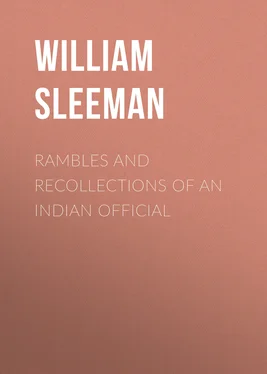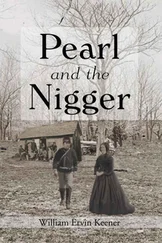William Sleeman - Rambles and Recollections of an Indian Official
Здесь есть возможность читать онлайн «William Sleeman - Rambles and Recollections of an Indian Official» — ознакомительный отрывок электронной книги совершенно бесплатно, а после прочтения отрывка купить полную версию. В некоторых случаях можно слушать аудио, скачать через торрент в формате fb2 и присутствует краткое содержание. Жанр: Путешествия и география, История, foreign_edu, foreign_antique, foreign_prose, на английском языке. Описание произведения, (предисловие) а так же отзывы посетителей доступны на портале библиотеки ЛибКат.
- Название:Rambles and Recollections of an Indian Official
- Автор:
- Жанр:
- Год:неизвестен
- ISBN:нет данных
- Рейтинг книги:4 / 5. Голосов: 1
-
Избранное:Добавить в избранное
- Отзывы:
-
Ваша оценка:
- 80
- 1
- 2
- 3
- 4
- 5
Rambles and Recollections of an Indian Official: краткое содержание, описание и аннотация
Предлагаем к чтению аннотацию, описание, краткое содержание или предисловие (зависит от того, что написал сам автор книги «Rambles and Recollections of an Indian Official»). Если вы не нашли необходимую информацию о книге — напишите в комментариях, мы постараемся отыскать её.
Rambles and Recollections of an Indian Official — читать онлайн ознакомительный отрывок
Ниже представлен текст книги, разбитый по страницам. Система сохранения места последней прочитанной страницы, позволяет с удобством читать онлайн бесплатно книгу «Rambles and Recollections of an Indian Official», без необходимости каждый раз заново искать на чём Вы остановились. Поставьте закладку, и сможете в любой момент перейти на страницу, на которой закончили чтение.
Интервал:
Закладка:
180
The crime of poisoning travellers is still prevalent, and its detection is still attended by the difficulties described in the text. In some cases the criminals have been proved to belong to families of Thug stranglers. The poisoning of cattle by arsenic, for the sake of their hides, was very prevalent forty years ago, especially in the districts near Benares, but is now believed to be less practised. It was checked under the ordinary law by numerous convictions and severe sentences.
181
In the Sahāranpur district, where the Ganges issues from the hills.
182
A small principality in Rohilkhand, between Murādābād and Bareilly (Barēlī).
183
The special laws on the subject, namely: Acts xxx of 1836, xviii of 1837, xix of 1837, xviii of 1839, xviii of 1843, xxiv of 1843, xiv of 1844, v of 1847, x of 1847, iii of 1848, and xi of 1848, are printed in pp. 353-7 of the author's Report on Budhuk alias Bagree Decoits, &c. (1849). See Bibliography, ante. No. 12.
184
I may here mention the names of a few diplomatic officers of distinction who have aided in the good cause. Of the Civil Service —Mr. F. C. Smith, Mr. Martin, Mr. George Stockwell, Mr. Charles Fraser, the Hon. Mr. Wellesley, the Hon. Mr. Shore, the Hon. Mr. Cavendish, Mr. George Clerk, Mr. L. Wilkinson, Mr, Bax; Majors-General —Cubbon and Fraser; Colonels —Low, Stewart, Alves, Spiers, Caulfield, Sutherland, and Wade; Major Wilkinson; and, among the foremost, Major Borthwick and Captain Paton. [W. H. S.]
The author's characteristic modesty has prevented him from dwelling upon his own services, which were greater than those of any other officer. Some idea of them may be gathered from the collection of papers entitled Ramaseeana , the contents of which are enumerated in the Bibliography, ante. No. 2. Colonel Meadows Taylor has given a more popular account of the measures taken for the suppression of Thuggee (thagī) in his Confessions of a Thug , written in 1837 (1st ed. 1839). The Thug organization dated from ancient times, but attracted little notice from the East India Company's Government until the author, then Captain Sleeman, submitted his reports on the subject while employed in the Sāgar and Nerbudda Territories, where he had been posted in 1820. He proved that the Thug crimes were committed by a numerous and highly organized fraternity operating in all parts of India. In consequence of his reports, Mr. F. C. Smith, Agent to the Governor- General in the Sāgar and Nerbudda Territories, was invested, in the year 1829, with special powers, and the author, then Major Sleeman, was employed, in addition to his district duties, as Mr, Smith's coadjutor and assistant. In 1835 the author was relieved from district work, and appointed General Superintendent of the operations for the suppression of the Thug gangs. He went on leave to the hills in 1836, and on resuming duty in February, 1839, was appointed Commissioner for the suppression of Thuggee and Dacoity, which office he continued to hold in addition to his other appointments.
Between 1826 and 1835, 1,562 prisoners were tried for the crime of Thuggee, of whom 1,404 were either hanged or transported for life. Some individuals are said to have confessed to over 200 murders, and one confessed to 719. The Thug approvers, whose lives were spared, were detained in a special prison at Jubbulpore, where the remnant of them, with their families, were kept under surveillance. They were employed in a tent and carpet factory, known as the School of Industry, founded in 1838 by the author and Captain Charles Brown. If released, they would certainly have resumed their hereditary occupation, which exercised an awful fascination over its votaries. Most of the Thug gangs had been broken up by 1860, but cases of Thuggee have occurred occasionally since that date. A gang of Kahārs (palanquin bearers) committed a series of Thug murders in, I think, 1877, at Etāwa, in the United Provinces of Agra and Oudh. The office of Superintendent of Thuggee and Dacoity was kept up until 1904, but the officer in charge was more concerned with Dacoity (that is to say, organized gang-robbery with violence) in the Native States than with the secret crime of Thuggee. Secret crime is now watched by the Central Criminal Intelligence Department under the direct control of the Government of India, and has to deal with novel forms of evil-doing. In India it is never safe to assume that any ancient practice has been suppressed, and I have little doubt that, if administrative pressure were relaxed, the old form of Thuggee would again be heard of. The occasional discovery of murdered beggars, who could not have been killed for the sake of their property, leads me to suppose that the Megpunnia variety of Thuggee, that is to say, murder of poor persons in order to kidnap and sell their children, is still sometimes practised.
Among the officers named by the author the best known is Sir Mark Cubbon, who came to India in 1800, and died at Suez in 1861. During the interval he had never quitted India. He ruled over Mysore for nearly thirty years with almost despotic power, and reorganized the administration of that country with conspicuous success (Buckland, Dict. of Indian Biography , Sonnenschein, 1906).
The Hon. Frederick John Shore, of the Bengal Civil Service, officiated in 1836 as Civil Commissioner and Political Agent of the Sāgar and Nerbudda Territories. In 1837 he published his Notes on Indian Affairs (London, 2 vols. 8vo), a series of articles dealing in the most outspoken way with the abuses and weaknesses of Anglo-Indian administration at that time.
Mr. F. C. Smith was Agent to the Governor-General at Jubbulpore in 1830 and subsequent years. The author was then immediately subordinate to him. Messrs. Martin and Wellesley were Residents at Holkar's court at Indore. Mr. Stockwell tried some of the Thug prisoners at Cawnpore and Allahabad as Special Commissioner, in addition to his ordinary duties: correspondence between him and the author is printed in Ramaseeana . Mr. Charles Fraser preceded the author in charge of the Sāgar district, and in January, 1832, resumed charge of the revenue and civil duties of that district, leaving the criminal work to the author. The Hon. Mr. Cavendish was Resident at Sindhia's court at Gwālior. Mr. George Clerk became Sir George Clerk and Lieutenant-Governor of the North-Western Provinces, Governor of Bombay, and Permanent Under- Secretary of State for India; he died at a great age in 1889. Mr. Lancelot Wilkinson, Political Agent in Bhopal, was considered by the author to be 'one of the most able and estimable members of the India Civil Service' ( Journey , ii. 403). Mr. Bax was Resident at Indore; Colonel (afterwards Sir John) Low, was Resident at Lucknow, and had served at Jubbulpore; Colonel Stewart and Major-General Fraser were Residents at Hyderabad; Major (Colonel) Alves was Political Agent in Bhopal and Agent in Rājputāna; Colonel Spiers was Agent at Nīmach, and officiated as Agent in Rājputāna; Colonel Caulfield had been Political Agent at Harautī; Colonel Sutherland was Resident at Gwālior, and afterwards Agent in Rājputāna; Colonel (Sir C. M.) Wade had been Political Agent at Lūdiāna; Major Borthwick was employed at Indore; Captain Paton was Assistant Resident at Lucknow (see Journey through Kingdom of Oudh , vol. ii, pp. 152-69).
Besides the officers above named, others are specified in Ramaseeana as having done good service.
Note. —Mr. Crooke suggests, and, I think, correctly, that the words Megpunnia and Megpunnaism ( ante , note 20, and Bibliography No. 7) are corruptions of the Hindī Mēkh-phandiyā , from mēkh , 'a peg', and phandā , 'a noose', equivalent to the Persian tasmabāz , meaning 'playing tricks with a strap'. Creagh, a private in a British regiment at Cawnpore about 1803, is said to have initiated three men into the peg and strap trick, as practised by English rogues. These men became the leaders of three Tasmabāz Thug gangs, whose proceedings are described by Mr. R. Montgomery in Selections of the Records of Government , N.W.P., vol. i, p. 312. A strap is doubled and folded up in different shapes. The art consists in putting in a stick or peg in such a way that the strap when unfolded shall come out double. The Tasmabāz Thugs seem to be identical with the 'Megpunnia' ( N.I.N.& Qu. , vol. i, p. 108, note 721, September 1891).
Читать дальшеИнтервал:
Закладка:
Похожие книги на «Rambles and Recollections of an Indian Official»
Представляем Вашему вниманию похожие книги на «Rambles and Recollections of an Indian Official» списком для выбора. Мы отобрали схожую по названию и смыслу литературу в надежде предоставить читателям больше вариантов отыскать новые, интересные, ещё непрочитанные произведения.
Обсуждение, отзывы о книге «Rambles and Recollections of an Indian Official» и просто собственные мнения читателей. Оставьте ваши комментарии, напишите, что Вы думаете о произведении, его смысле или главных героях. Укажите что конкретно понравилось, а что нет, и почему Вы так считаете.












